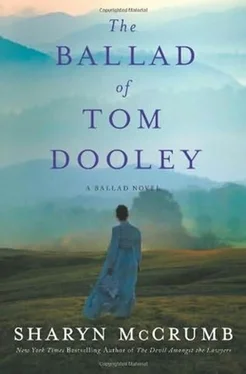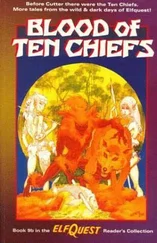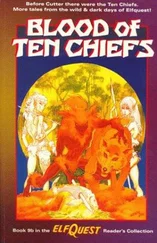“I never knew that. He never talks about the War. Did he serve with you?”
“Same war, same army-that’s about all. He joined up early, in the summer of ’61, the 26th North Carolina, same as Ann’s brother Pinkney. Wash and I went into the 42nd, in the spring of ’62. He had a hard war, did James. He was tomfool brave, too.”
I resolved to find out more about that, for it didn’t square with what I had seen of him. “Funny to think of you and James Melton being neighbors both here and there. Did the two of you stick together there in the prison camp?”
He shook his head. “I never saw him at all. We were in different regiments, and him being wounded might have made a difference in where they put him. I don’t know. We have talked about it since, him and me, and we reckon that I was already in there a month before he got taken prisoner in Richmond-early April, that was. And he didn’t reach Point Lookout until early May. They let me out a couple of weeks before him, too. I was already home three weeks before he got back.”
“What was it like, then, being a prisoner?”
He was quiet there in the darkness for so long, I didn’t think he was going to answer me at all, but finally he said, “I saw the ocean.”
I never had, of course, being born up the mountain two hundred miles from the Carolina coast. “The ocean. Well! What’s it like?”
Tom nodded toward Wash, sprawled out on his back and trying to keep a leaf in the air with his breath. “It’s like that there blanket, only wet.”
“The Federals kept you penned up by the seashore? That sounds all right. I have heard tell that rich folk go to the shore for pleasure, of a summer.”
“Not like this they don’t.” He was fairly spitting out the words. “I never want to smell salt in the air again as long as I live. The Federals packed a thousand of us in like cord wood on a train to Maryland, and when we got there they stuck us on a godforsaken spit of land caught between the Potomac River and the Chesapeake Bay. We were penned in like hogs on a stretch of dirty sand, crammed into tents that gave us no relief at all from the weather. Like hogs.”
“I reckon it was crowded then?”
“More people than you’ve ever seen in your life, Pauline. Maybe twenty thousand, I heard somebody say. We had no firewood, and damn little of anything else. The water was so filthy, we could taste the shit in it. All we ever thought about was food.”
“I thought the Yankees had plenty of food.”
“Maybe they did. But they didn’t feel like giving us any of it. When they heard that Yankee prisoners down south were doing without something, they’d take it away from us to get even. They’d turn us loose on a stretch of shore sometimes to wash, and while we were there we’d snatch up what we could find-seaweed or clams and such. But there were thousands of us Rebs and damn few shellfish. I learned how to catch rats, though.”
I took another pull from the jug to wash that thought out of my head. “Naw, I couldn’t eat rat.”
Tom wasn’t looking at me. He was staring off into the woods, like he was somewhere other than here. “I reckon we had some boys who couldn’t bring themselves to eat rat neither. Most of them didn’t make it out of there.”
“How long were you shut in there?”
“Long enough. Three months, more or less-March to June. I lost track of the days, but I was spared the bitter winter and the late summer storm season. It was bad, though. When they turned me loose to walk home, my clothes hung off me like I was a scarecrow. Hand over the jug.”
I passed him the whiskey and didn’t much begrudge it to him. I could see he needed it. “What do you reckon then, Tom? Was that there camp worse than the War itself?”
He wiped his mouth on his sleeve, and looked down at Wash, who was laying there with his eyes shut. “The War was different for everybody. Anybody who wasn’t there can’t be told what it was like. Sometimes it was so dull, I felt like I was sleep walking, and then again sometimes a minute seemed to last most of a day. We saw things that all the whiskey in the world won’t wash out of my head. I was sick half the time, too.”
“So you said.”
“Well, I was.” He scowled at me, not liking that I’d said that, making light of his troubles, but men always make a song and dance about the least little bit of suffering. They can’t tolerate half of what a woman endures as a matter of course.
“I thought I’d never get enough to eat again,” he said. “Even now-and I have been home ten months-my mama lets me have a hunk of corn bread to put by my bed in the night. I dream sometimes that I am back there in the War, or penned up in that infernal camp, and I wake in a cold sweat. The bread laying there within reach reminds me that I’m home safe again.”
“Well, it’s over now,” I said briskly, for his voice was shaking a little, and I was scared I might laugh at the thought of this big strapping soldier crying out in the night for his mama. Maybe Ann would have felt like comforting him, but I didn’t. Besides, I had not come out here to take on any more sorrow. I had enough troubles of my own without having to listen to other people’s laments. “Best not to think on it, Tom. It don’t seem to be troubling Wash there none. The best way to heal any wound is to pour whiskey on it.”
He took another pull on the jug. “I’ll tell you this-once I got shut of that war, I decided that I had done all the hard work and doing without that I intended to do in this lifetime. From now on, I’m going to take it easy, and play my fiddle, and take orders from no man.”
“Sounds like a fine life,” I said. “If you can keep clear of working.”
“And another thing. I’ll never let them put me in prison again. No more being penned up like a hog. I’druther be dead.”
Wash Anderson had been dozing while we talked, but he sat up all of a sudden, and made a grab for the whiskey. “Play another tune, Tom! All that war talk will just bring you low and spoil the evening for all of us.”
Tom gave him a faint smile, and reached back behind the log for his fiddle and bow. After a minute of twiddling with the strings, he began sawing away on a spritely tune, and when he was done, I asked him what it was.
“Soldier’s Joy,” he said softly. “I always wondered what that might be.”
He played a few more tunes that evening, but mostly we passed the jug from hand to hand, and by and by they got tired of music, and reached for me instead of the whiskey, but by then they had both got so drunk they couldn’t do it but one time each, so I told myself that I got off cheap on that occasion. I got no pleasure from rolling on the cold ground and being pawed at by the likes of them.
I endured it, but when Tom tried to jump me a second time and couldn’t manage it, he rolled over beside me and peered at my face in the pale moonlight. He rubbed the back of his hand along my cheek, which was sallow and rough, from the harsh winter. Then he threw back his head and laughed. “Damn, Pauline, it’s too bad you ain’t pretty like your cousins. That would make it easier to do you. But for plain girls, once is my limit.”
I never forgave him for that. From then on, anything that happened to him, I figured he had it coming.
“Our client’s husband served with you in the 26th,” Captain Allison told me.
“Melton… Melton…” I shook my head. “I cannot place him. There were so many…”
I joined the army early in the War-on May 4, 1861, only weeks after the firing on Fort Sumter-when there was a carnival atmosphere to the enterprise, with much flag-waving and cheering crowds, gold braid and shining swords, but I did not stay in the ranks to the bitter end. As a man of substance in Asheville, I was expected to raise a company of soldiers and to lead those men off to war in defense of our home state. I had no more military experience than a blind mule, but in those heady days in 1861, that was a commonplace. Suddenly a country that had one well-trained army split into two countries, with much of that original army going over to the newly formed Confederacy. This schism left vacancies on both sides of the conflict, and so the officers’ ranks were filled with amateurs-like myself.
Читать дальше












